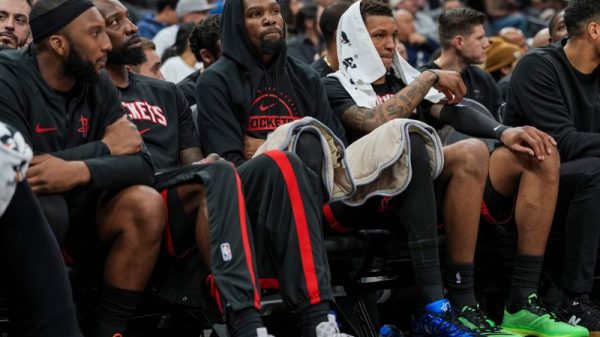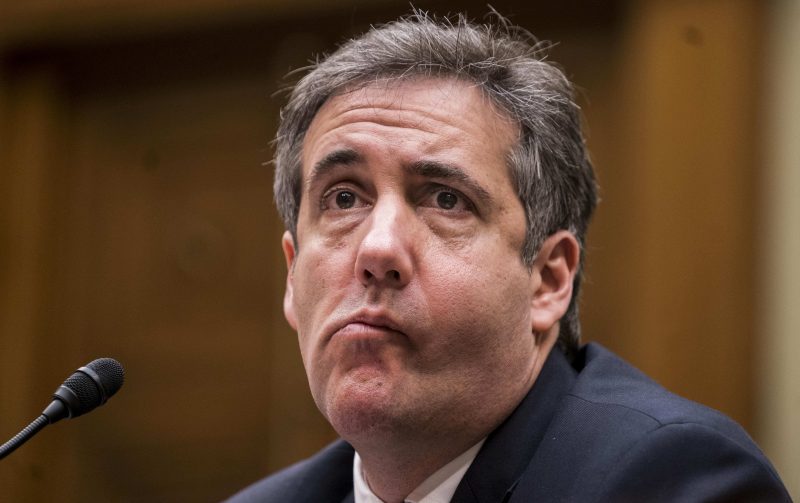If Donald Trump and Donald Trump Jr. are to be believed, the prospect of the former president soon being indicted by a Manhattan grand jury suffered a potentially fatal blow Wednesday. Father and son each hyped a newly uncovered letter sent on behalf of Trump’s former attorney Michael Cohen that denied that Cohen violated campaign finance laws during the 2016 election.
For reasons we’ll get into in a moment, such a revelation could be important. But this one isn’t and, here at least, the overheated claims of the Trumps are not to be believed.
You’d be forgiven for not immediately realizing that. In addition to Trumps senior and junior posting the letter on social media, the former president also shared an article from a site called “DC Enquirer,” which describes itself as being “a new and rapidly growing conservative news organization.” Its article was titled, “BREAKING: New BOMBSHELL Emerges in Bragg’s Case Against Trump, Contradicts Michael Cohen’s Testimony.” (The word “bombshell” is a favored bit of spice in Trump’s own rhetorical kitchen.)
Then there was an article at Trump ally John Solomon’s site Just the News, presenting a more restrained headline: “Cohen attorney letter to FEC appears to undercut DA Bragg’s Trump case.” It was this article that users of Truth Social, Trump’s bespoke social media platform, were shown if they clicked on a push alert the app sent to its users. That alert showed a siren emoji followed by “JUST IN: Bombshell letter undercuts case to indict Trump.”
The New York Post had a story of its own, headlined “2018 letter shows Michael Cohen lying to feds about Stormy Daniels payment.” You can see the gradations here. From the “BREAKING BOMBSHELL” to a pointed mention of erosion to Manhattan District Attorney Alvin Bragg’s case against Trump to the New York Post’s less-speculative declaration of the contents of the letter. For a consumer of right-wing media, the temperature of the story might have varied, but the point was clear: Something had shifted in the left’s unfair attempt to take Trump down. Yet another day of reckoning was upon Trump’s opponents.
To a large extent, this is the business model of the conservative media and its abiogenetic creation, Donald Trump himself. The forever war between left and right is marked by a nearly unbroken string of victories in this universe, although the scales and boundaries of those victories are very carefully managed. The audience demands to hear more about how the left is faltering and feeble and the right is strong and surging. So Just the News and the DC Enquirer and the New York Post give the audience what it’s looking for.
But, again, this story is completely hollow.
At issue is whether Cohen’s payment of $130,000 to adult-film actress Stormy Daniels violated federal campaign finance laws. Just as a campaign staffer can’t spend $130,000 on positive television ads promoting the candidate without reporting it to the Federal Election Commission (FEC), an agent of a campaign (that is, someone working on the campaign’s behalf) can’t spend the same amount to keep a negative news story from being seen by voters without reporting that expenditure.
You can see the loophole here: If the payment wasn’t meant to affect the election, it wouldn’t need to be reported. That’s why former senator John Edwards (D-N.C.) was not convicted of campaign-finance violations; his similar payment was arguably not related to his political efforts. And in the letter made public this week, that’s what attorneys for Cohen argued to the FEC: The payment wasn’t a campaign contribution, and it wasn’t reimbursed by the Trump Organization.
But citing that letter as dispositive is like denying that the Titanic struck an iceberg because a lookout the prior day didn’t report seeing any ice in the water. Things changed.
The letter is dated Feb. 8, 2018. News of the Daniels payment had been broken by the Wall Street Journal less than a month prior. Cohen was still working for Trump and scrambling to conceal the details of the payment. In early April, federal investigators searched Cohen’s home and office, kicking off a legal fight in which Cohen tried to prevent the government from using material as evidence because, he claimed, it was covered by his attorney-client relationship with Trump.
That dragged out for a while. By the summer of 2018, though, Cohen had given up the fight. He pleaded guilty to several federal crimes on Aug. 21, 2018, including a campaign-finance violation related to the Daniels payment. His confession wasn’t the government’s only evidence, certainly, but it’s useful for the point at hand: What Cohen’s lawyers said in a non-sworn letter in February 2018 on Cohen’s behalf was contradicted in a sworn statement from Cohen six months later.
What’s more, another attorney for Trump, former New York mayor Rudy Giuliani, admitted that the money Cohen spent had been repaid by the Trump Organization. So that part of the February letter, too, was later undermined by admissions from within Trump’s own camp.
That repayment is why Trump is at risk of indictment. Reporting on the closed-door grand-jury discussions suggests that Bragg is looking at a potential charge of falsifying business records, since the repayment to Cohen for that $130,000 was codified as a legal retainer. Since this alleged falsification was in service of covering up another alleged crime — probably one related to the campaign-finance violation itself — the charge could be a felony.
Trump and his allies are hyping the February 2018 letter for three reasons. First, they hope to undermine the idea that there was an underlying crime and, therefore, a reason for the falsification charge to be a felony. Second, they’re generating bite-size snacks for the endlessly famished right-wing mediaverse. And, third, they’re trying to undercut Bragg’s efforts, and, by extension, those of other potential prosecutors and other Democratic opponents.
By hyping the letter, though, they’re also achieving another, unintended goal: making obvious how willing they are to elevate any claim whatsoever, regardless of validity or importance.



























